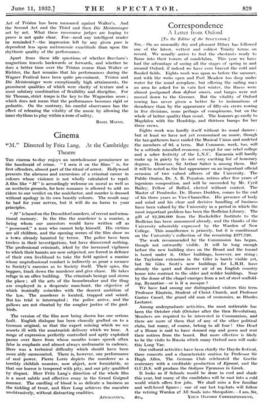Cinema
"M." Directed by Fritz Lang. At the Cambridge Theatre
THE cinema to-day enjoys an unwholesome prominence as the handmaid of crime. " I seen it on the films" is, for first offenders, almost part of the ritual of arrest. Hollywood presents the alarums and excursions of a criminal career in colours whose violence is not wholly calculated to repel. A film like "M" is accordingly welcome on moral as well as on aesthetic grounds, for here romance is allowed to add no riders to our verdict on the malefactor, and murder is dressed without apology in its own beastly colours. The result may be bad for your nerves, but it will do no harm to your principles.
"M "is based on the Dusseldorf murders, of recent and sensa- tional memory. In the film the murderer is a maniac, a being whom our ancestors would have written off as "possessed," a man who cannot help himself. His victims are all children, and the opening scenes of the film show us a town already haunted by terror. The police have been tireless in their investigations, but have discovered nothing. The professional criminals, irked by the increased vigilance to 'which their haunts are now subjected, arc forced in defence of their own livelihood to take the field against a maniac whose unprofessional conduct is indirectly as great a menace to Society's enemies as to Society itself. Their spies, the beggars, track down the murderer and give chase. He takes refuge in an office building. The criminals besiege and storm the place ; all the arts of the housebreaker and the thug are employed in a desperate man-hunt, the objective of which ironically coincides with the dearest ambition of the law. The murderer is located, trapped and seized. But his trial is interrupted ; the police arrive, and the gallows are not cheated by the rougher justice of the gaol- birds.
The version of the film now being shown has one serious fault. English dialogue has been clumsily grafted on to a German original, so that the expert miming which we see assorts ill with the amateurish delivery which we hear. A range of expression perfectly controlled and aptly exploited passes over faces from whose mouths issues speech often false in emphasis and almost always undramatic in cadence. Here was a technical difficulty which should have been more ably surmounted. There is, however, one performance of real power. Pierre Lorre depicts the murderer as a terribly childish monster, now abject, now formidable, so that our horror is tempered with pity, and our pity qualified by disgust. Herr Fritz Lang's direction of the whole film is a most subtle and effective essay in the Grand Guignol manner. The curdling of blood is as delicate a business as the tickling of trout, and Herr Lang achieves the macabre unobtrusively, without distracting crudities.
APEMANTUS..


































 Previous page
Previous page